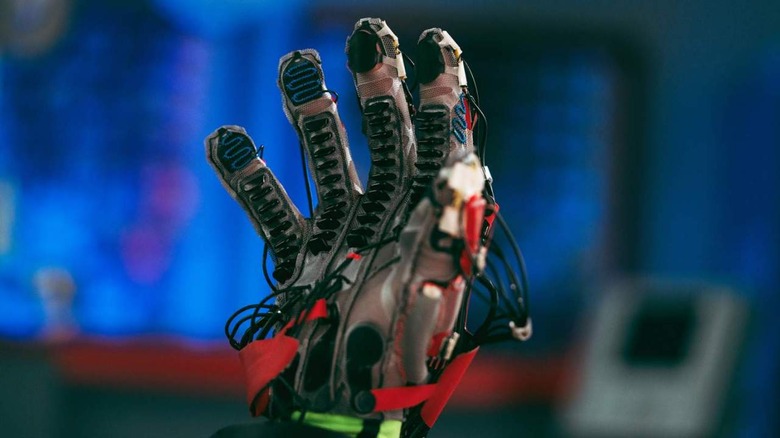Meta Reality Labs Research Team Shows Off A Haptic Glove For VR
Facebook parent company Meta is showing off one of the projects that its Reality Labs Research teams have focused on to bring more immersion to virtual reality. The project is a haptic glove designed to bring a sense of touch to virtual reality environments in the future. The goal of the project is to allow people to touch the virtual world.The glove hints at a future where someone enjoying a virtual reality game could feel an object in their hand in the virtual world, such as a ball or a brick. They have to be comfortable and customizable with the ability to reproduce a wide range of sensations inside the virtual world. The gloves would be able to reproduce sensations, including texture, pressure, and vibration.
The research team says that it's in the early stages of the research and its goal is to pair the gloves with the VR headset to allow immersive experiences. The gloves would also interact with AR glasses. Facebook says developing the gloves requires inventing new domains for scientific research. Over the last seven years, its teams have focused on moving human-computer interaction forward across multiple disciplines.

A few examples of categories the research teams are developing for the haptic glove project include perceptual science, soft robotics, microfluidics, hand tracking, and haptic rendering. The focus on perceptual science is an effort to explore combining haptic feedback with visual and auditory feedback to convince the perceptual system of the user that it's feeling the weight of an object.
Research in soft robotics focuses on creating soft actuators consisting of small and soft motors all over the glove able to move in concert to deliver sensations to the user. Microfluidics research aims to develop the world's first high-speed microfluidic processor. The processor would be a small microfluidic chip able to control airflow moving through the actuators.
Hand tracking is critical with any virtual reality system because the system needs to know where to deliver the sensation on the hand. Advanced hand tracking technology would enable the virtual reality system to know exactly where the user's hand is in the virtual environment and how the hand is interacting with the virtual object. Haptic rendering is also important, with Facebook working on a haptic renderer able to send precise instructions to actuators on the hand. The instructions would be based on the hand's location and the properties of the virtual object in the environment, including texture, weight, and stiffness.
While the haptic glove project started as a "moonshot," Meta says it's increasingly feasible as its research teams continue to work. Those researchers have worked on different aspects of the project for the last seven years and have created new technology, techniques, and disciplines that have pushed soft robotics. Researchers also created new materials and manufacturing processes during that time.
There's no indication of how far away the team is from creating a haptic glove that could be commercialized. It takes time to move the multiple research areas forward to perfect the technology, and Meta is clear that for now, the technology is only suited to the lab. However, at some point in the future, the research could result in a product suitable to be sold alongside virtual reality headsets in stores worldwide.
Facebook rebranded as Meta in late October, aiming to lead the metaverse push. At the time, founder and CEO Mark Zuckerberg said that the Facebook brand was so tightly linked to one product that it couldn't represent everything the company was doing today or in the future. Another product that Meta is working on is the Project Nazare AR glasses. The glasses have integrated hologram displays, projectors, batteries, radios, custom silicon chips, cameras, speakers, and sensors to map the world around the user. The product is very early and could change significantly before it's ready for market.
